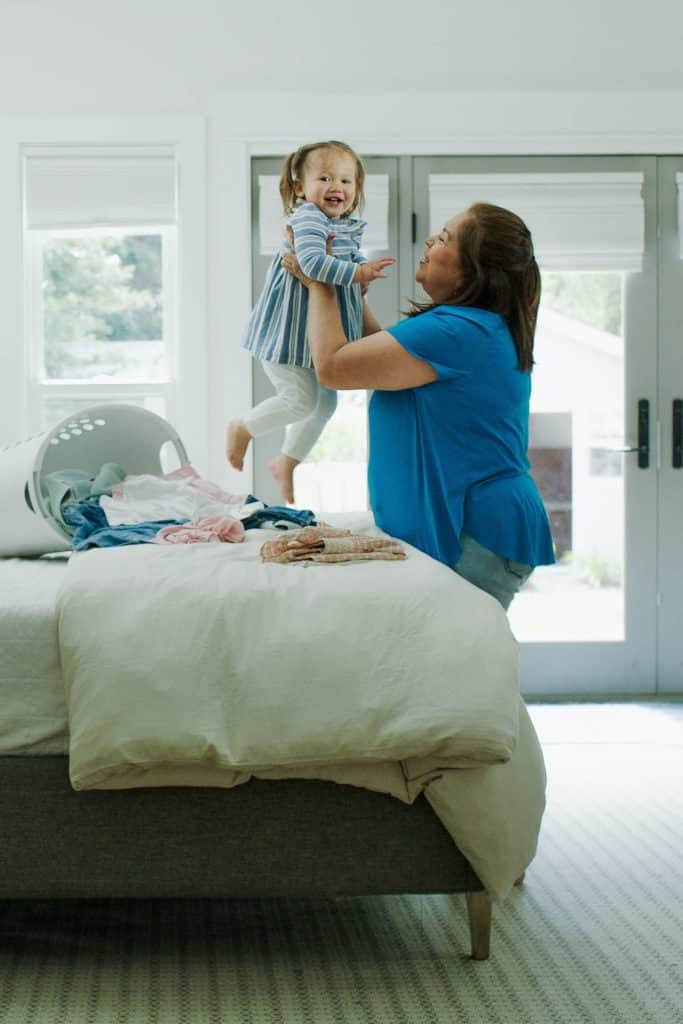Live In Nanny Contract: Why They’re Essential for Every Household
- By Stephanie Fornaro
- November 20, 2025

The recent viral New York nanny who refused to leave her employer’s property highlights the risks of going without a live in nanny contract. Find out why a live in nanny contract is essential, what to include in one and how to find the best live in nanny contract template.
You’ve found the perfect live-in nanny, and you think to yourself, finally they’re the missing piece of your family puzzle. Like many families in similar situations, you open your home and your heart, trusting this will be a lasting match built on mutual respect and care.
But as one New York couple recently learned, good intentions aren’t always enough. Their nanny—who cited tenants’ rights and refused to leave her employer’s property—is a reminder that even the most promising arrangements need clear boundaries and protection.
And that all starts with a well-crafted live in nanny contract. A live-in nanny contract protects both you and your employee so that you don’t become the next viral headline on the New York Post.
👉Want a live-in nanny contract but don’t know where to start? Connect with our experts to help you draft a personalized live in nanny contract template perfect for your family.
What Is a Live In Nanny Contract?
A live-in nanny contract is a formal written agreement between a family and their nanny that outlines the terms of employment, responsibilities, compensation, and living arrangements. It serves as the backbone of a healthy, transparent working relationship, especially when your nanny lives under the same roof. The contract is always agreed upon and signed by both parties prior to the first day of work.
And, unlike an agreement for a nanny who doesn’t live with the family, a live-in contract goes a step further: it covers details unique to shared living situations like housing provisions, privacy expectations, household rules, time off, and what’s considered “on-duty” versus “personal” time.
Think of it as a roadmap that sets everyone up for success. It gives your caregiver structure and security, while offering you as the employer peace of mind knowing that boundaries and expectations are clearly defined from day one.
Why Families Need a Live In Nanny Contract
When you invite someone to share your home and care for your children, clarity is kindness for everyone involved. Imagine if you started a new job without a contract or job description. That would be completely unacceptable, and the same goes for the nanny/family relationship.
Without a contract, misunderstandings can easily snowball—from differing interpretations of “off hours” to confusion around household roles. In some cases (like that now-viral New York nanny who refused to leave the property), the lack of clear terms can escalate into legal and emotional turmoil.
A well-written live-in nanny contract ensures everyone starts on the same page, minimizing gray areas and creating a foundation of mutual respect. While covering yourself as an employer legally is certainly the foundation, creating a formal document is also about preserving the trust and harmony that make your home and your childcare partnership thrive.
Related: Nanny Contracts: Everything You Need to Know
What to Include in a Live In Nanny Contract
Just like no two families are alike, no two live in nanny contracts are exactly the same. While details may differ, here are some key elements to discuss with your nanny and agree on prior to their first day of employment:
1. Compensation and Benefits
Spell out the hourly or weekly pay rate, overtime structure, and any benefits such as health insurance, paid holidays, and vacation time. Define how and when your nanny will be paid.
2. Work Schedule and Duties
Define clear start and end times, days off, and expectations for evening or weekend coverage. Include both childcare responsibilities (like meals, homework help, bedtime routines) and household-related tasks (laundry, errands, light housekeeping).
3. Room and Board
Detail the living arrangements—private bedroom, bathroom access, meals, and any household amenities included. Clarify whether room and board and things like utilities are part of total compensation or provided separately.
4. Privacy and Boundaries
Living together can blur lines. Outline expectations around privacy, use of shared spaces, and guidelines for guests, potential pets or personal time to maintain mutual respect.
5. Time Off and Sick Leave
Include paid time off, personal days, and what to do in case of illness or emergencies. This ensures your nanny feels supported while keeping communication clear. Clearly state in the contract expectations for when your children are sick as well.
6. Contract Length and Termination
State how long the agreement is valid, how performance will be reviewed, and what notice is required to end the employment. This adds stability for both sides.
7. Confidentiality and Conduct
Include a clause that protects your family’s privacy and sets expectations for professionalism within the home. Some families also ask their nanny to sign an NDA or exclusivity agreement, which would be a separate contract to this one.
👉Avoid costly mistakes. Learn how Hello Nanny! can help you avoid future headaches.
Market Specific Considerations
What’s standard and legal in San Francisco may look very different in Dallas, Boise, or New York City. When creating a live-in nanny contract, it’s essential to understand how regional laws, cost of living, and local market norms shape what’s appropriate and fair.
1. State and Local Labor Laws
Employment laws vary widely by state. Some areas have specific regulations around overtime pay, required breaks, or domestic worker protections that directly impact live-in arrangements. A compliant contract protects your nanny and your family from potential legal and financial pitfalls.
2. Cost of Living and Competitive Pay
In high-demand regions like the Bay Area or the tri-state area, compensation packages often include higher base pay and additional perks such as health benefits or access to family cars and memberships. In smaller markets, housing and meals may represent a larger portion of total compensation. Tailoring your agreement to local standards helps you stay competitive and attract top talent.
3. Housing and Tax Implications
How room and board are valued (and taxed) can differ based on location. Some states treat these as taxable benefits, while others don’t. Outlining these details clearly in your live-in nanny contract ensures transparency from day one. It’s worth noting that when it comes to housing and tax implications, we suggest consulting with your own CPA or attorney before customizing your live in nanny contract template.
Related: Hiring a Nanny? Here’s What You Need to Know
There Is No Downside to a Live In Nanny Contract
The viral story of the New York “squatting nanny” should serve as a cautionary tale for any family considering live-in childcare. What began as a well-intentioned arrangement quickly spiraled into a legal and emotional ordeal.
It’s a reminder that a live-in nanny contract isn’t optional and it is never a luxury. Without one, roles can blur, responsibilities shift, and trust can erode. With a clear agreement in place, you establish a roadmap for employment and a successful long-term partnership by outlining duties, compensation, house rules, and exit procedures. And of course, misunderstanding may arise, but with a contract in place, those should be mitigated quickly.
Remember that a thoughtful contract sets the tone for respect, stability, and open communication. It protects your family, honors your nanny’s professionalism, and ensures that your home remains a place of harmony—not viral headlines.
Live In Nanny Contract FAQs:
How do I find a live in nanny contract template?
We offer an attorney-drafted 25-page work agreement and help facilitate signing as well. Our team of experts will help you craft the contract template to match your family’s specific needs. Check it out here.
Can I draft a live in nanny contract myself?
A contract is not something you want to DIY or cut corners on. Bringing in professional expertise is a must when creating a legally binding contract. We always recommend partnering with an attorney or working with our experienced team, who are well-versed in market-specific employment laws and best practices. Together, we’ll make sure your contract is clear, compliant, and built to support a healthy, lasting working relationship. To get in touch with our team, reach out here.
My nanny is already living with us. Is it too late to have them sign a contract?
While it would have been optimal to sign a contract prior to the start of employment, it’s never too late to discuss, negotiate, and mutually sign one. We suggest you first discuss the topic with your nanny to lay the foundation for why a live-in nanny contract would be beneficial for both of you.
What happens if I don’t have my live in nanny sign a contract?
Without a clear contract, you risk a situation like the recent New York family experienced—a nanny refusing to leave the home, citing tenants’ rights, or not fulfilling their work responsibilities. Clear agreements from the start prevent confusion and protect both your family and your caregiver. Without one, you’re at risk and not protected.
👉Protect your home and your hire. Speak to Hello Nanny! about drafting a professional live-in nanny contract.
Please follow and like us:
You may also like…
- By Stephanie Fornaro
- By Blueberry Pediatrics
- By Stephanie Fornaro


